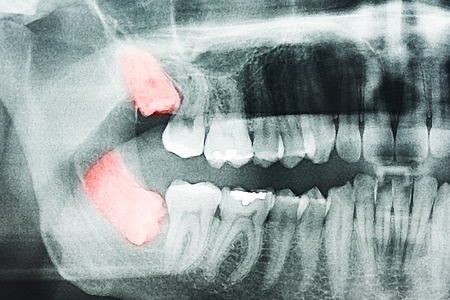Your wisdom teeth, also known as third molars, are your final set of molars to erupt within your mouth. Typically, your wisdom teeth come in between the ages of 16 and 20. However, sometimes, your jaws aren’t big enough to allow these teeth to erupt. As a result, your wisdom teeth may emerge at an angle or don’t fully emerge at all and will become impacted. When this occurs, Dr. Jon Erickson at Danville Family Dentistry, located in Hendricks County, Ind., may recommend wisdom teeth removal to prevent future oral health problems.
Wisdom teeth extraction requires oral surgery. Prior to surgery, you’ll receive anesthesia, so you shouldn’t feel any pain during the removal process. Dr. Erickson may have to make an incision into your gums or bone to remove your teeth. If so, he’ll place stitches to close the wounds. These stitches usually dissolve after a few days.
Following surgery, you can expect some temporary pain, discomfort, swelling, bruising, and bleeding during the healing process. However, most Hendricks County patients recover quickly. Typically, wisdom teeth removal recovery takes 3 to 4 days, although some patients may require a week to recover. To help you heal properly and to prevent any complications, here are some recovery tips to follow:
- Activity. Plan to rest the remainder of the day following surgery. While in most cases, you can resume your normal activities after the first day, plan to take it easy for a few days. Also, avoid rigorous exercise or heavy activity for a few days. You don’t want to do anything that could dislodge the blood clot that forms in the extraction site. Otherwise, a surgical complication called dry socket could occur. Dry socket exposes bone and nerve endings in the extraction area, causing severe pain.
- Swelling. To reduce swelling, bruising, or discomfort, apply an ice pack over your jaw. Leave the pack on for 20 minutes, then remove for 20 minutes. Repeat as needed.
- Bleeding. You should expect some bleeding. Keep a gauze pad over the extraction site for at least 30 minutes after the surgery. For heavy bleeding, bite down on the gauze pad for about 30 minutes before removing it. In place of a gauze pad, you may want to use a moistened tea bag. The tannic acid in the tea helps contract the blood vessels and allow the blood clot to set.
- Mouth Care. For the first 2 hours after surgery, limit eating, drinking, and talking. For the first 24 hours following surgery, or if your extraction site continues to bleed, avoid brushing, flossing, rinsing or spitting. Don’t smoke or drink with a straw for a few days, too. You could dislodge the blood clot. After 24 hours, gently brush your teeth with a soft toothbrush, but avoid the surgical area as best as you can. Rinse with salt water frequently to keep your mouth clean and prevent an infection.
- Diet. For the first day following surgery (and maybe longer), eat soft foods, like eggs, mashed potatoes, applesauce, yogurt, or gelatin. Drink lukewarm or cold fluids. Don’t drink alcohol, coffee, soda, or hot beverages. Gradually, add semi-soft foods. However, you want to avoid dislodging the blood clot.
- Medications. Take pain medications and antibiotics as directed by Dr. Erickson.
While your pain and swelling should improve with each day, call Dr. Erickson right away if you experience any of the following serious symptoms:
- Severe, throbbing pain 3 to 4 days after surgery.
- Swelling that gets worse instead of better.
- Swollen lymph nodes in your neck area.
- Excessive bleeding that doesn’t stop with pressure.
- Low-grade fever that persists.
- Pus discharge.
By following these recovery tips after your wisdom teeth removal, you should be back to normal within a week. If you have any questions about your recovery, contact Danville Family Dentistry’s Hendricks County office at 317-745-4400. Dr. Erickson knows how to help get you through your wisdom teeth removal recovery safely and quickly. Just use your “wisdom” and follow his advice.
Disclaimer: The information included in this article is for educational purposes only. It should not be used as a substitute for professional medical advice, diagnosis or treatment.


 (317) 745-4400
(317) 745-4400 info@danvilledentalcare.com
info@danvilledentalcare.com